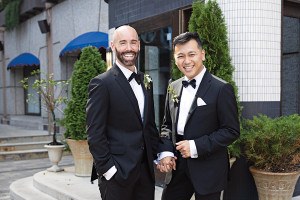The Post-Wedding Blues are Real
Here’s what to do about them.

Photo via Getty Images
The day after Taylor DeLorey had her dream wedding in Hyannis Port in September 2018, she was drained. “Weeks [before your wedding], you’re running on adrenaline and constantly thinking about things that need to get done,” she says. “[After it was over] the sadness kind of crept in. It was like, ‘Wait, what are we supposed to do for the remainder of the year?’” She felt it, her husband felt it, and her sister and mother did, too, she says. Those “down” feelings lasted for about a month, until the couple went on and then returned from their honeymoon.
Samantha Burns, a Boston-based relationship counselor and dating coach known as the “Millennial Love Expert,” says that Taylor’s experience is not such an unusual one these days. There’s even a name for it: the post-wedding blues. “[There are so many] highs that come with getting engaged—whether it’s sharing the exciting news with your friends and family, planning this big party, picking out a wedding dress, and then experiencing one of the most special days of your life,” she says. “It’s totally normal to feel down after something you’ve spent so much time and energy planning and anticipating [is over].”
While Taylor says she wasn’t necessarily depressed after her wedding, nor did her feelings take away from her newlywed bliss, some brides and grooms experience symptoms that go beyond your average “blue” period. “[They’ll] come in with a depressed affect: feeling sad, or tearful, or lacking motivation, even having trouble functioning at work or in their relationship. [It’s] this feeling of being let down or feeling empty or not having anything to look forward to,” Burns explains. For some, these feelings can become especially isolating when the sadness is coupled with guilt. “Once the wedding is over people are expected to be happy newlyweds,” says Brookline-based couples counselor Mimi Licht. “It can feel embarrassing and shameful [to feel] lost, and [they may feel] the need to cover it up and look like everything is great, when in fact it can be a hard transition.”
So why is this often such a tricky time for couples? As Burns notes, a significant amount of time and effort goes into planning a wedding. Therefore, when it all comes to a close, it’s easy forget how to return to the status-quo. It’s partly physiological, too: With all the exciting milestones, festivities, and attention leading up to the day, the brain experiences constant floods of dopamine. “You’re having this huge, literal high in the same area of the brain that gets activated during drug and alcohol addiction, gambling, and sex,” Burns explains. “All of this dopamine is released, and then all of a sudden you’re going back to life as normal.”
Another piece of the puzzle: The belief that married life will immediately feel different. Nowadays, when many couples live together before tying the knot, the day-to-day experience as a couple goes largely unchanged. If you’re expecting “life to be magically different after getting married or [for your] relationship problems to disappear,” Burns says, it can feel disappointing when that’s not the case, particularly if you were struggling with relationship issues before the wedding. And while planning a wedding can certainly be stressful, focusing on those preparations can distract couples from underlying problems in a relationship; when you’re discussing cake flavors or your first dance song, that’s time you’re not spending addressing deeper preexisting difficulties.
Now, here comes the part where we say there’s no need to panic: There are steps you can take to prevent the post-wedding blues. Burns and Licht agree that it’s paramount that you make time to discuss life beyond your wedding day and create a joint vision for the first year of marriage while you’re engaged. Have a dialogue about what’s important to you, decide on any special traditions you want to start, and discuss experiences you want to have together. Premarital counseling can also help with this. “[Counseling is] not just about figuring out what’s wrong and how to improve problems, but it’s also about highlighting your strengths and making sure that you know what you can do to set yourselves up for a happily ever after,” Burns explains. As exciting as planning a wedding is, it’s also important to make sure that this impending celebration is not the entire focus of your relationship during this time. “Continue dating each other,” Burns adds. Go out together, have fun, and prioritize the relationship, she says. “Don’t get consumed with wedding talk 24/7.”
If you’ve already tied the knot and are in the midst of the blues, there are ways to get through that, too. First, while it’s normal to have “down periods,” if they’re impacting your day-to-day functioning (for example, hurting your performance at work, your relationship, or altering your sleeping or eating habits), you should seek professional support, Burns says. Otherwise, there are small steps you can take to keep the joy going after “I do.” While it’s important to move forward, it’s also totally healthy (and encouraged, Burns says) to embrace what’s left of wedding hoopla. Bride Taylor says this helped her and her family cope. When you receive your professional photos and videos from the day, for example, take time to sit down and enjoy them as a couple, chat about your favorite wedding moments with family and friends, and share favorite shots on social media.
Pinpointing new goals to tackle individually or as a couple is another way to find a new sense of purpose. “Refocus all of the energy you spent planning your wedding into something fun or challenging, whether it’s a professional, a personal, or a fitness goal, and then talk with your partner about your plan,” Burns suggests. Similarly, she says that research shows that couples who exercise together and support each other’s fitness goals are the ones who thrive.
Lastly, if you’re hooked on making plans, try coordinating a trip or a new experience. That might be mean a week-long vacation, a short excursion to explore a nearby town, or even dinner at new restaurant you’ve never visited. “[Having] something to look forward to and trying new things together will naturally help lift your mood and the connection with your partner,” Burns says. “It gives us that loving feeling.”
Getting married? Start and end your wedding planning journey with Boston Weddings' guide to the best wedding vendors in the city.


